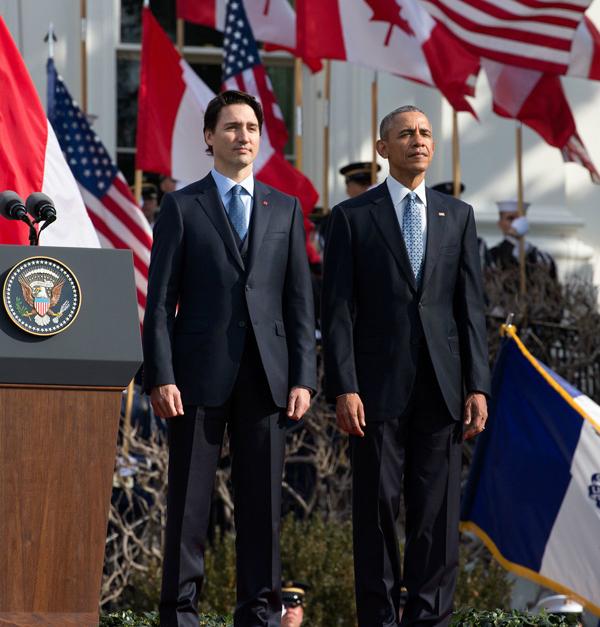Trudeau in Washington: USA and Canada pledge stronger efforts to protect the Arctic

Prime Minister Justin Trudeau of Canada visited president Barack Obama in Washington D.C. this week. (Photo: Chuck Kennedy)
Washington D.C: Canada’s Prime Minister Justin Trudeau has visited President Obama in Washington this week, the first Canadian State visit in nearly 20 years. The two leaders signed an agreement Thursday, pledging more cooperation and stronger efforts to combat climate change, particularly in the Arctic.
Washington D.C: Canada’s Prime Minister Justin Trudeau has visited President Obama in Washington this week, the first Canadian State visit in nearly 20 years. The two leaders signed an agreement Thursday, pledging more cooperation and stronger efforts to combat climate change, particularly in the Arctic.
Norwegian version here.
Prime Minister Trudeau and President Obama share a progressive agenda, and efforts to combat climate change was an important part of the discussions when the two leaders met in the White House Thursday.
The agreement they signed declares a “new partnership” to confront challenges in the Arctic, and the two countries will take on a joint leadership role internationally to spearhead climate change and environmentally sound economic development. Obama and Trudeau committed to a reduction of methane emissions from the oil and gas sector by 40-45% below 2012 levels by 2025, and further exploration of additional methane reductions.
Science-based decision-making
The bilateral agreement also commits both countries to “science-based decision-making” regarding the Arctic, a change from Canada’s climate skeptic previous prime minister, the conservative Stephen Harper. There is also a strong emphasis on collaboration with indigenous communities.
Four areas of Arctic policy are of particular importance:
1) Conserving Arctic biodiversity through science-based decision-making. Canada and the U.S. reaffirm their goals of protection at least 17% of land areas and 10% of marine areas by 2020.
2)
3)
4)
Ban on drilling?
Environmental organizations were cautiously optimistic about the agreement. The website ThinkProgress quotes Environment America executive director Margie Alt saying that “Today’s agreement sets a new bar for conserving and protecting the fragile Arctic, one we believe is high enough to ban future oil and gas development. As President Obama prepares to release the next draft of his five-year plan for oil and gas drilling, we urge him to meet the bar he boldly set today.”
Greenpeace executive director Annie Leonard is somewhat less charitable:
“This agreement comes as the Obama Administration is considering a plan to put drilling in the Arctic — as well as in the Gulf of Mexico and even in new areas in the Atlantic — into play for oil companies. Today’s agreement between the US and Canada is commendable only as a stepping stone toward a fully protected Arctic without fossil fuel extraction.”
It is still unclear what the Obama administration will decide on the issue of drilling in the Arctic.
According to ThinkProgress, Secretary of the Interior Sally Jewell said on a call with reporters Thursday morning that
“Going forward, decisions on activities like shipping, commercial fishing, oil and gas exploration, and drilling will depend, in part, on ensuring commercial activity does not diminish our ability to meet our climate change and Arctic stewardship goals.”
Oil and gas industry pushback
The powerful oil and gas industry may push back if Obama tries to initiate new and stronger limits for methane emissions. It is doubtful whether the administration will be able to complete the changes necessary to reach the goal of a 40-45% cut, and it may be up to the next president to fulfill the pledges made this week.
Democratic candidates Hillary Clinton and Bernie Sanders have said they will continue Obamas climate change agenda. But among the Republican candidates, there are few signs that an agreement strengthening limits for the oil and gas industry will have much support.
Enthusiasm on both sides of the border
The Trudeau visit has caused quite a stir in the normally rather blasé Washington. Press coverage of this meeting “between two of the coolest state leaders in the world” has been massive, and both in Canada and in the US, there is great enthusiasm for this new and warmer chapter in the relationship between the neighbors.
Both Obama and Trudeau are in a hurry to deliver on their promises from Paris, and the Arctic appears to be the area where we may see some of the most active follow-up. If they are to deliver on their pledges this week, we ought to hear a lot about the Arctic from both Washington and Ottawa in the months to come.
